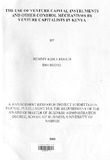| dc.description.abstract | Venture capital has become a major vehicle for the funding of start-up companies in
many countries, most notably the United States. Venture capital is now the financing
mode of choice for projects where “learning” and “innovation” are important.
Because of their innovative nature, venture firms carry a substantial risk of failure.
Only a minority of start-ups are high-return investments. This is due to shortcomings
associated with information asymmetry, Moral hazard and agency costs.
The study was a survey carried out to determine the financial instruments used by the
venture capitalist in Kenya, and the factors that influence the choice of the
instruments. The study further sought to determine the control and monitoring
mechanism employed by the venture capitalist to ensure success of venture
investments.
The target population included investment banks, development financial institutions,
venture capital funds and special private equity organisation identified as the major
venture capital investors in the country. Nineteen venture capitalists, which included
seven companies incorporated as venture capitalist by the Registrar of Companies
under Companies Act, seven listed in the African Venture Capital Association
(AVCA) directory as venture capital funds operating in Kenya and five listed in
Association of African Development Finance Institutions (AADFI) as providing
venture capital as part of their development agenda were approached during the
study. Seventeen Fund / Equity Managers of fifteen venture capitalists were
interviewed and consequently nineteen venture capital deals were reported on.
The data on financial instruments used by the venture capitalist and the reasons for
use was obtained through a researcher-administered questionnaire. The questionnaire
was structured such that data on the specific control and monitoring mechanism
were also collected. The data collected from the field was classified according to their
common characteristics to enable both qualitative and descriptive methods of
ix
statistical analysis to be carried out. The data was presented through tabulation and
charting techniques
The study concluded that venture capital in Kenya is operated within the same
concept as those overseas. Majority of the companies in which venture capitalist
invest in are in seed/start-up stages of development. These are companies, which
cannot get loans or even supplier’s credit. The venture capitalist uses various
financial instruments as a vehicle of investment. They include redeemable preference
shares preferred equity, common equity, combination of debt and common equity and
pure common equity. Like overseas venture capitalists, majority of Kenyan venture
capitalists use preferred equity as an instrument of choice to invest with in an investee
company.
The venture capitalist gave various reasons/combination of reasons for choosing
particular instruments. Maximization of returns of funds to funds invested was ranked
the first in the level of importance. The tax incentive reasons was found not to be
important in Kenya as there is no particular instrument, which provided tax incentives
to venture capitalists.
Notably, development finance institutions use combination of debt and common
equity. This is because as public-private partnership agencies, they are traditionally
supporting the financing of startups and medium sized firms by publicly guaranteed
loans in order to promote regional development.
Majority of the contracts give the venture capital the right to demand some level of
performance from the investee company. Some of the control mechanism being
practise include staging of funding against predetermine milestones, board
representation and being involved in the running of the investee company.
The venture capital industry in Kenya should further be developed to enhance
economic development especially in technology-oriented industries. There is
therefore a need for government support in regulating the industry and providing
mechanisms and incentives that will support domestic resource mobilization into
private equity. | en |

